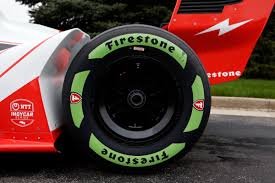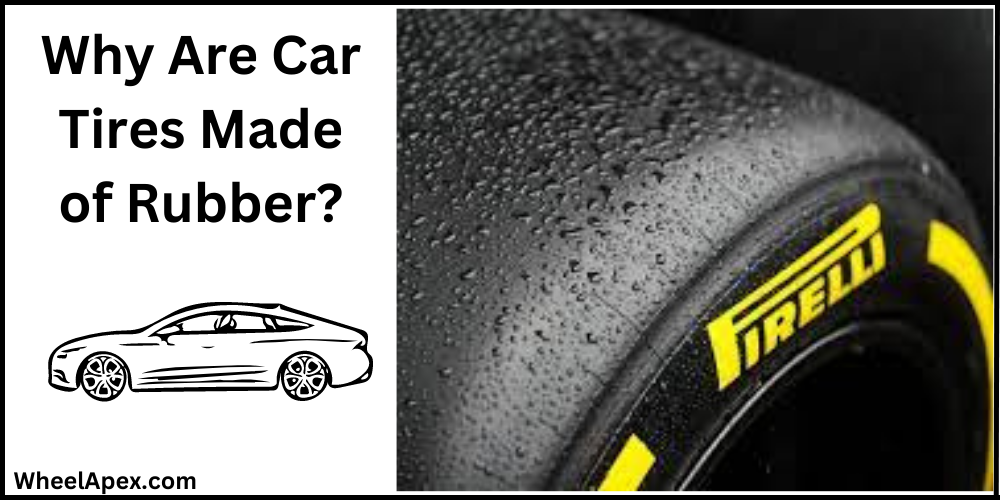At the point when we contemplate vehicles, quite possibly the most fundamental part that promptly strikes a chord is the tire. Vehicle tires assume an essential part in giving the important grasp, soundness, and well-being expected for smooth and effective driving. Be that as it may, have you at any point asked why vehicle tires are made of elastic?
Why Are Car Tires Made of Rubber? Elastic, a characteristic polymer obtained from the sap of elastic trees, has a few key qualities that make it the material of decision for tire fabricating. Right off the bat, elastic displays fantastic versatility, permitting it to disfigure under the heaviness of the vehicle and afterward rapidly return to its unique shape.
This versatility converts into a smoother ride, as the tire proficiently ingests shocks and vibrations brought about by lopsided street surfaces, potholes, or hindrances.
In this article, we will investigate Why Are Car Tires Made of Rubber, explanations for this universal decision, and dig into the one-of-a-kind properties of elastic that make it an optimal material for creating elite execution tires.
Why Are Car Tires Made Of Rubber?
Vehicle tires are a fundamental part of vehicles, giving the critical connection point between the vehicle and the street. While present-day tires comprise different complex materials and plans, elastic remaining parts are the essential decision for their development.
We will investigate the motivations behind why vehicle tires are transcendently made of natural rubber and dive into the remarkable properties of elasticity that make it an optimal material for this reason.
Car tires are made of rubber because they provide a durable and flexible material that offers optimal traction, shock absorption, and resistance to wear, ensuring safe and efficient vehicle performance on various road surfaces. Rubber’s unique properties enhance grip, stability, and overall driving experience.

Foothold and Hold
One of the essential prerequisites of vehicle tires is to give sufficient footing and grasp out and about the surface. Elastic has phenomenal frictional properties, permitting tires to keep a strong hold on different street conditions, including dry, wet, and cold surfaces.
The versatile idea of elasticity empowers it to adjust to the street surface, expanding contact and further developing a foothold. This fundamental trademark guarantees safe dealing with, slowing down, and mobility, improving generally driving execution.
Shock Ingestion and Solace
Elastic flexibility plays a huge part in retaining shocks and vibrations, making the ride more agreeable for travelers and limiting the effect on the vehicle. The air-filled elastic tire goes about as a pad, engrossing street flaws and diminishing the exchange of vibrations to the vehicle’s suspension and undercarriage. This capacity improves the general solace and soundness of the ride, giving a smoother driving encounter.
Sturdiness and Life span
Vehicle tires are exposed to different anxieties, including street erosion, temperature changes, and effects from street flotsam and jetsam. Elastic displays exceptional strength and versatility, empowering tires to endure these requested conditions. It opposes mileage, keeps up with its shape, and stays adaptable over overstretched periods.
Also, elastic’s protection from debasement from openness to daylight, ozone, and synthetics further adds to the life span of tires, guaranteeing they can persevere through significant mileage before requiring substitution.
Heat Dissemination
During driving, tires create critical intensity because of grinding with the street. Why are car tires made of rubber? Elastic has brilliant intensity scattering properties, permitting it to disperse the intensity successfully and forestall unnecessary temperature development.
This element is significant for forestalling tire victories, which can happen when the elastic overheats and loses its underlying trustworthiness. By effectively overseeing heat, elastic tires keep up with their strength and respectability, guaranteeing ideal execution and security.
Sound Decrease
The outside sound produced by the communication between tires and the street surface can add to driver exhaustion and decrease traveler solace. Elastic’s capacity to retain vibrations hoses commotion, decreasing the general sound communicated into the vehicle lodge. Also, tire producers consolidate explicit track examples and plan components to additionally limit outside sound, upgrading the general driving experience.
Adaptability and Versatility
Elastic’s adaptability permits tires to disfigure and change following various surfaces and street conditions. It empowers the tire to hold the street surface actually, giving better dependability and control during cornering and slowing down moves. The capacity to adjust to changing street conditions, for example, wet or frigid surfaces, improves well-being by lessening the gamble of slipping or failing to keep a grip on the vehicle.
FAQs
Why Are Tires Rubber And Not Metal?
Tires are made of elastic rather than metal since elastic offers a few urgent benefits. Elastic is adaptable, giving an agreeable ride and better footing. It assimilates shocks, improving security and solace. Elastic likewise has a lower thickness than metal, lessening a vehicle’s general weight, further developing eco-friendliness, and limiting street mileage.
Are Car Tires Made of Rubber?
Vehicle tires are principally made of elastic. In any case, they additionally contain different materials like texture, steel belts, and substance mixtures to improve strength, hold, and execution. Elastic fills in as the external layer, giving footing and engrossing shocks, making it a critical part of tire production.
Why Are Car Tires Made of Synthetic Rubber?
Vehicle tires are made of manufactured elastic fundamentally for strength and execution. Engineered elastic offers predictable quality, versatility, and protection from wear, guaranteeing tires can endure different street conditions and temperature changes. Its substance piece can be calibrated to streamline hold, take care of, and eco-friendliness, making it the best decision for protected and productive driving.
Conclusion:
All in all, the utilization of elastic in vehicle tires is a consequence of a novel mix of properties making it an optimal material for the requesting necessities of auto applications. Why are car tires made of rubber? Elastic offers great foothold, strength, and protection from mileage, permitting tires to hold the street really and give a smooth and agreeable ride. Also, its versatility retains shocks and effects, adding to better-taking care of and well-being out and about. The capacity of elastic to endure a large number of temperatures and weather patterns further upgrades its reasonableness for tires.
Moreover, elastic’s adaptability takes into account simple forming and shaping, empowering the creation of different tire plans to take care of various driving necessities and inclinations. While headways in tire innovation have presented elective materials, elastic remaining parts are the predominant decision because of their demonstrated exhibition and unwavering quality. As the car business keeps on developing, continuous exploration and advancement will probably additionally upgrade the properties of elastic, guaranteeing that it stays an indispensable piece of vehicle tires into the indefinite future.
Sources:
- By Steve Bloxham Why are tires made of rubber? Posted 5 Years Ago.

